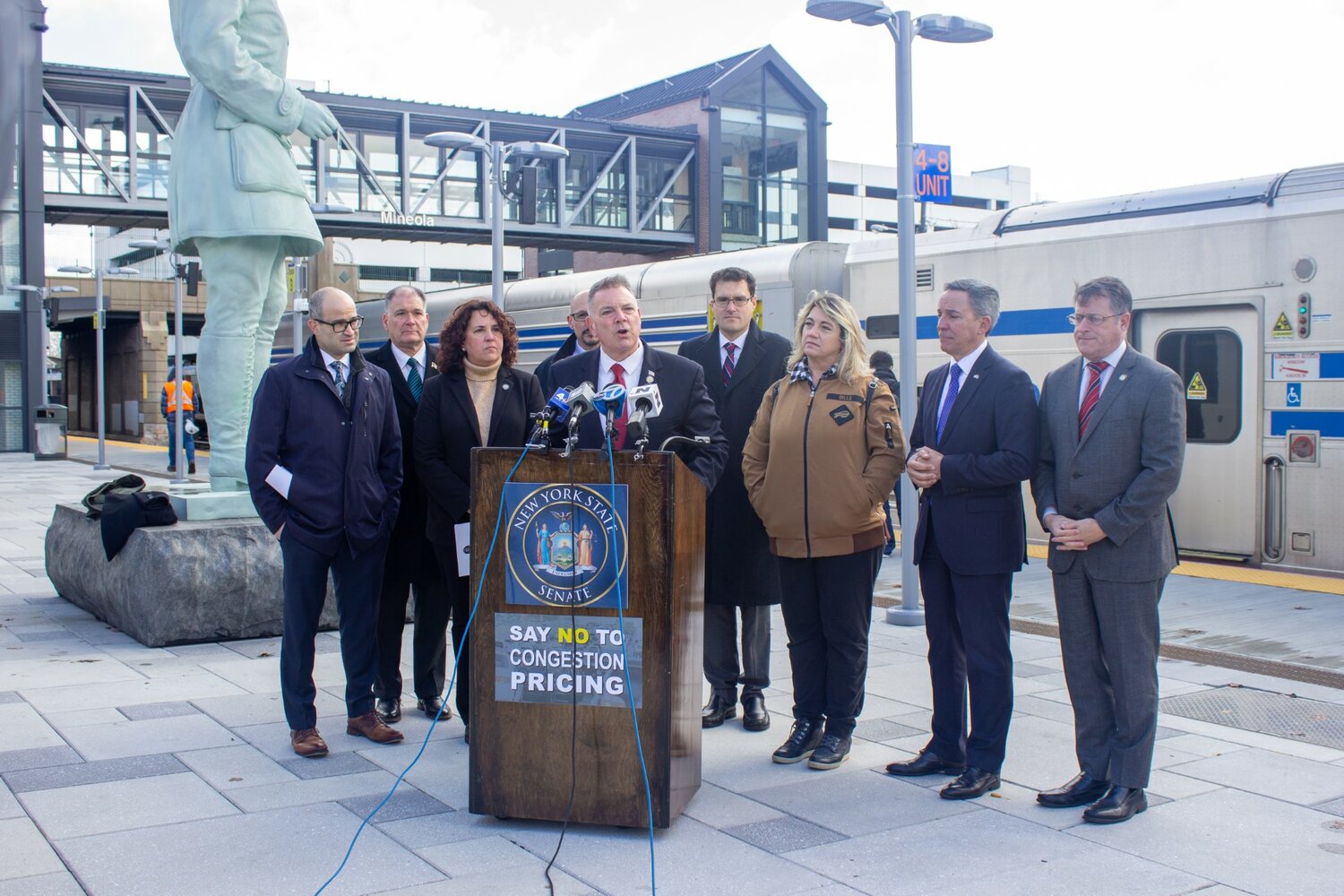Long Island electeds want Hochul to stop NYC congestion pricing
They called it a “hidden tax” and even “highway robbery.” That’s how Long Island-based lawmakers described the impending congestion pricing system planned for New York City’s Financial District, and are calling on the governor to do away with it for good.
The area’s representatives in Albany gathered at the Long Island Rail Road station in Mineola last week to make those demands loud and clear to Gov. Kathy Hochul. Regular passenger vehicles could be hit with charges as much as $7.50 to enter Lower Manhattan, with commercial vehicles looking at daily tolls ranging between $15 and $36.
Funds collected would support efforts by the Metropolitan Transportation Authority to continue maintaining and expanding its mass transit service — including the LIRR — while the agency maintains it could help push people from driving cars to simply taking the rails.
State Sen. Steve Rhoads doesn’t agree.
“What congestion pricing does is make it easier for the MTA to give them a license to steal from every resident, from every commuter,” he said.
Wantagh Chamber of Commerce president Cathy Powell says the pricing plan affecting vehicles coming in below 61st Street would especially impact businesses in her community that prefer to deliver products directly to Manhattan clients, saving money on shipping. And it would only hurt businesses that are still recovering from the pandemic.
“It’s important that we speak up for Long Island,” she said, “and we speak up for small businesses, and people who live on Long Island who travel to the city for work.”
Powell added workers such as first responders and tradesmen who commute to lower Manhattan would not be exempt from the congestion toll, although the MTA’s mobility review report indicated emergency, public works and other qualifying vehicles transporting people with disabilities would indeed be able to enter Manhattan for free. Low-income drivers as well as those paying tunnel tolls receive a discount.
“The billions of dollars the MTA already has should be used toward the governor's goal of improving infrastructure,” Assemblyman Ed Ra said. “Encouraging the use of public transportation over private vehicles — without considering the notorious unreliability of the MTA — will only funnel congestion into another flawed system.”
Yet, that system has vastly improved over time, according to LIRR acting president Rob Free. That includes a new Manhattan terminal at Grand Central, a rebuilt concourse at Penn Station, a mainline third track, and a new station servicing the UBS Arena and horse racetrack at Elmont.
“The vast majority of Long Islanders who go to Manhattan use mass transit and take advantage of all these capital investments,” Free said in a statement. They “don’t contribute to the extreme congestion that causes ambulances, police, fire and buses to be unable to move.”
The pricing plan is now in a 60-day public comment period before a final vote, and local lawmakers are encouraging their constituents to get out and voice their opinions.
“It’s time for this madness to stop,” Rhoads said.
It wasn’t just Albany lawmakers showing up over the weekend — U.S. Rep. Anthony D’Esposito was at the Mineola station as well, calling congestion pricing a burden for the working class.
“Gov. Hochul’s misguided congestion pricing plan is nothing more than a new tax on already overtaxed New Yorkers,” he said.
Hochul’s office did not respond to a request for comment.
The tolling initiative, according to Rhoads, is not about reducing congestion, but to gain more money from those living and working in the larger metropolitan area.
“This has nothing to do with a cleaner and greener economy that encourages the use of mass transit because the MTA is planning on making every mode of transportation to get in and out of the city of New York more expensive,” the state senator said
Powell says the congestion plan punishes commuters for not taking mass transit, and adds that the MTA should develop a better plan encouraging commuters to use buses, subways or trains.
“It’s costly enough on Long Island,” Powell said. “The governor seems to think that we’re the Hamptons.”






